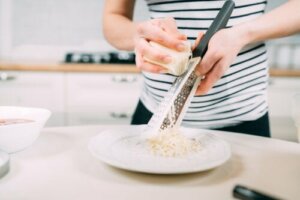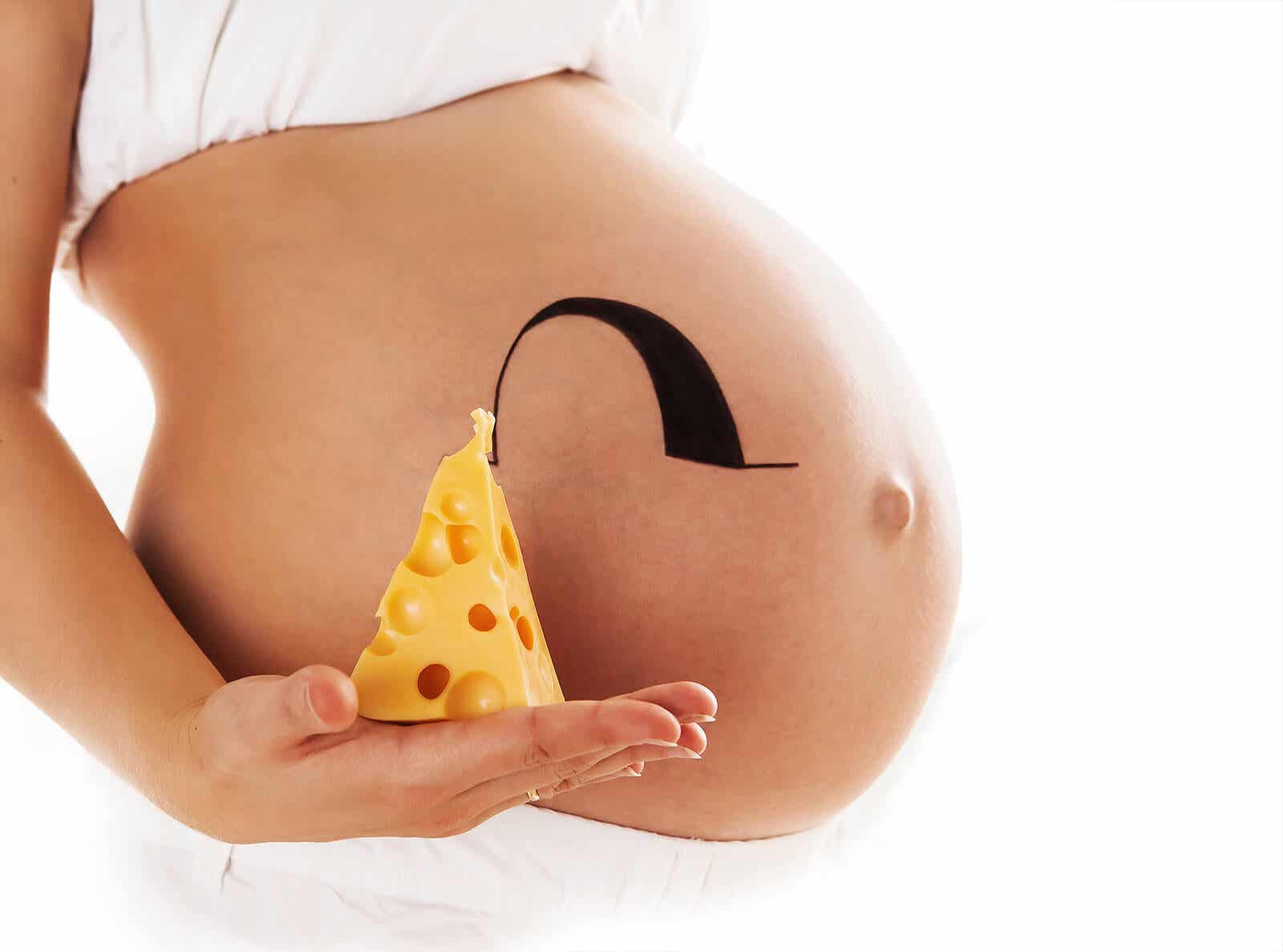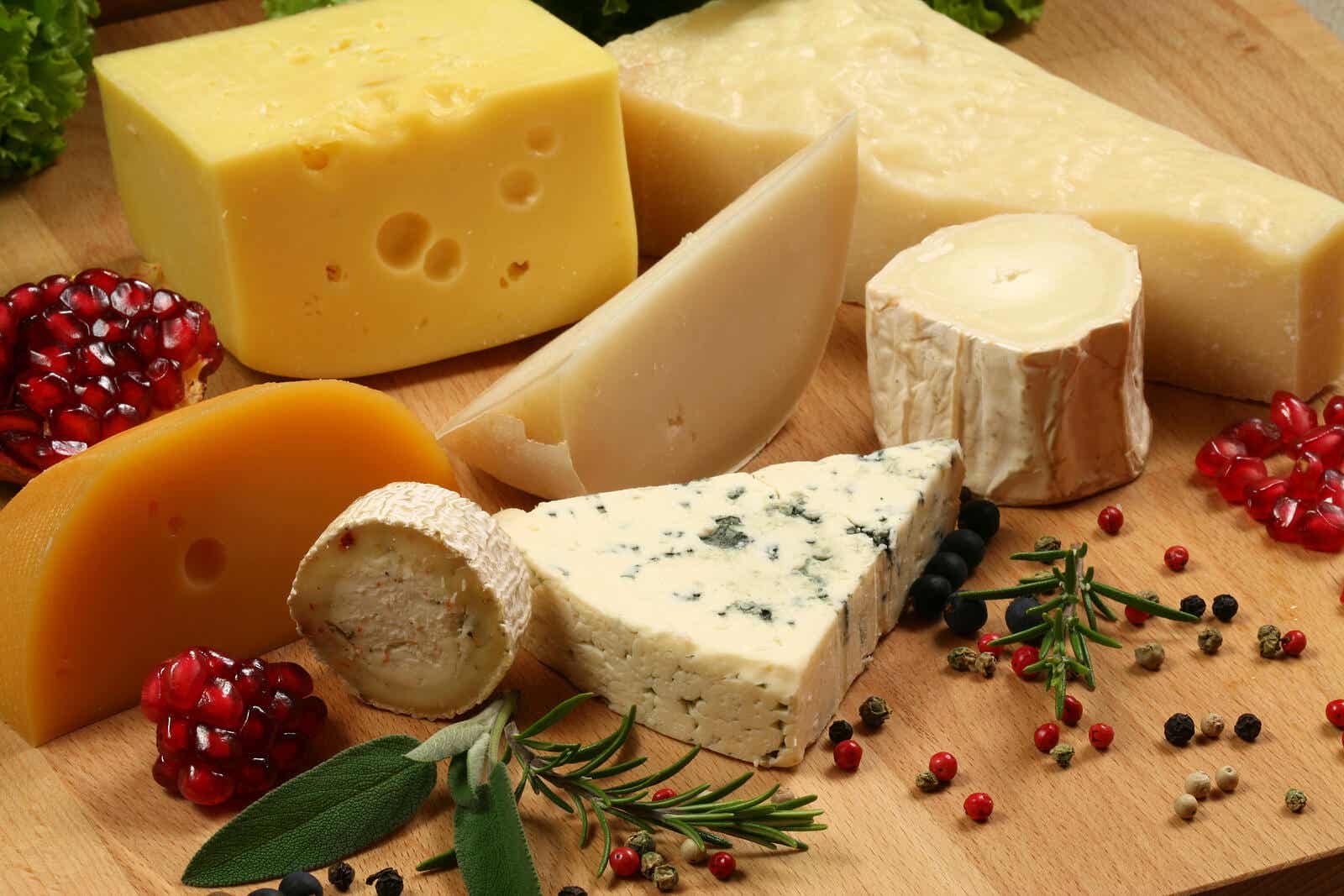What Cheese Can You Eat During Pregnancy?


Written and verified by the nutritionist Saúl Sánchez Arias
Dairy products are usually recommended, because they’re foods that are rich in nutrients. However, since nutritional needs vary during pregnancy, sometimes it’s better to avoid certain foods. So, what cheese can you eat during pregnancy?
It’s important to bear in mind that, during this period, you should avoid food that may cause microbiological risk. This is because it can lead to different digestive problems. Therefore, you’ll have to adjust your diet to contribute to a healthy fetal development.
What cheese can you eat during pregnancy?
One of the most important things to bear in mind is that all cheeses must be pasteurized. As a result, you’ll avoid listeria, a bacteria present in raw milk, which may cause food poisoning.

Following this idea, you can eat pasteurized sheep milk cheese, goat cheese and cow cheese. From a microbiological point of view, these products are absolutely safe.
These are some examples of safe cheeses, which wouldn’t cause any harm to the mother or the fetus: cheddar, edam, Emmental, feta, gouda, mascarpone, provolone, cottage, cream cheese and fresh cheese.
Avoid eating soft cheese during pregnancy
Even though the types of cheese we’ve mentioned before are safe to eat during pregnancy, you should avoid eating soft, fresh and blue cheese. This is because these types of cheese don’t go through the proper heat treatment necessary to avoid bacterial growth.
Even though they may not cause food poisoning, during pregnancy, you should avoid all kinds of possible risks.
Try to avoid mozzarella (when prepared without pasteurized milk), Burgos cheese, camembert, roquefort, gorgonzola or Cabrales cheese (intense blue cheese from Spain).
Is it good to eat cheese during pregnancy?
In fact, it’s good for you to eat dairy products and cheese during pregnancy. These types of products include calcium, a mineral that improves bone development and health.
Furthermore, they contain high-value proteins, which include essential amino acids and proper digestibility values. According to the magazine Food & Functions, these nutrients are essential to guarantee good health and a healthy lean body mass.
According to a study from Advances in Nutrition, consuming dairy products during pregnancy results in a bigger baby birth weight.
The importance of other dairy products during pregnancy
Besides cheese, pregnant women should also include fermented dairy products in their diet. These products contain probiotic bacteria that selectively colonize the digestive tract, which is beneficial for the body.
As a result, it reduces the risk of suffering from digestive or metabolic disorders. Examples of these disorders are diarrhea and constipation, which are very common during pregnancy. In fact, these problems make women have a hard time during this period, and it affects their life style in a negative way.

As we’ve tried to explain in this article, it’s safe to eat cheese during pregnancy. However, remember that all milk products should be pasteurized. This way, you’ll reduce microbiological risks that lead to food poisoning, which can affect the fetus.
Finally, if you have any concerns regarding a certain type of cheese, it’s best to avoid it. During pregnancy, try to avoid all possible dietary risks.
Reading the labels on the dairy products will be a good idea to see if the milk used in them has been pasteurized. If you have more questions about this, ask your doctor or nutritionist for advice.
Dairy products are usually recommended, because they’re foods that are rich in nutrients. However, since nutritional needs vary during pregnancy, sometimes it’s better to avoid certain foods. So, what cheese can you eat during pregnancy?
It’s important to bear in mind that, during this period, you should avoid food that may cause microbiological risk. This is because it can lead to different digestive problems. Therefore, you’ll have to adjust your diet to contribute to a healthy fetal development.
What cheese can you eat during pregnancy?
One of the most important things to bear in mind is that all cheeses must be pasteurized. As a result, you’ll avoid listeria, a bacteria present in raw milk, which may cause food poisoning.

Following this idea, you can eat pasteurized sheep milk cheese, goat cheese and cow cheese. From a microbiological point of view, these products are absolutely safe.
These are some examples of safe cheeses, which wouldn’t cause any harm to the mother or the fetus: cheddar, edam, Emmental, feta, gouda, mascarpone, provolone, cottage, cream cheese and fresh cheese.
Avoid eating soft cheese during pregnancy
Even though the types of cheese we’ve mentioned before are safe to eat during pregnancy, you should avoid eating soft, fresh and blue cheese. This is because these types of cheese don’t go through the proper heat treatment necessary to avoid bacterial growth.
Even though they may not cause food poisoning, during pregnancy, you should avoid all kinds of possible risks.
Try to avoid mozzarella (when prepared without pasteurized milk), Burgos cheese, camembert, roquefort, gorgonzola or Cabrales cheese (intense blue cheese from Spain).
Is it good to eat cheese during pregnancy?
In fact, it’s good for you to eat dairy products and cheese during pregnancy. These types of products include calcium, a mineral that improves bone development and health.
Furthermore, they contain high-value proteins, which include essential amino acids and proper digestibility values. According to the magazine Food & Functions, these nutrients are essential to guarantee good health and a healthy lean body mass.
According to a study from Advances in Nutrition, consuming dairy products during pregnancy results in a bigger baby birth weight.
The importance of other dairy products during pregnancy
Besides cheese, pregnant women should also include fermented dairy products in their diet. These products contain probiotic bacteria that selectively colonize the digestive tract, which is beneficial for the body.
As a result, it reduces the risk of suffering from digestive or metabolic disorders. Examples of these disorders are diarrhea and constipation, which are very common during pregnancy. In fact, these problems make women have a hard time during this period, and it affects their life style in a negative way.

As we’ve tried to explain in this article, it’s safe to eat cheese during pregnancy. However, remember that all milk products should be pasteurized. This way, you’ll reduce microbiological risks that lead to food poisoning, which can affect the fetus.
Finally, if you have any concerns regarding a certain type of cheese, it’s best to avoid it. During pregnancy, try to avoid all possible dietary risks.
Reading the labels on the dairy products will be a good idea to see if the milk used in them has been pasteurized. If you have more questions about this, ask your doctor or nutritionist for advice.
All cited sources were thoroughly reviewed by our team to ensure their quality, reliability, currency, and validity. The bibliography of this article was considered reliable and of academic or scientific accuracy.
- Achón M, Úbeda N, García-González Á, Partearroyo T, Varela-Moreiras G. Effects of Milk and Dairy Product Consumption on Pregnancy and Lactation Outcomes: A Systematic Review. Adv Nutr. 2019 May 1;10(suppl_2):S74-S87. doi: 10.1093/advances/nmz009. PMID: 31089739; PMCID: PMC6518133.
- Consejería de Sanidad y Servicios Sociales del Gobierno de Cantabria. La seguridad alimentaria durante el embarazo.
- Mayo Clinic. Infección por listeria. Febrero 2022.
- National Health Service Wales. Pregnancy Guide: foods to avoid. Setiembre 2022.
- Pregnancy Birth and Baby. Foods to avoid when pregnant. Australian Government Department of Health. Agosto 2020.
- Vannucci L, Fossi C, Quattrini S, Guasti L, Pampaloni B, Gronchi G, Giusti F, Romagnoli C, Cianferotti L, Marcucci G, Brandi ML. Calcium Intake in Bone Health: A Focus on Calcium-Rich Mineral Waters. Nutrients. 2018 Dec 5;10(12):1930. doi: 10.3390/nu10121930. PMID: 30563174; PMCID: PMC6316542.
- Wu G. Dietary protein intake and human health. Food Funct. 2016 Mar;7(3):1251-65. doi: 10.1039/c5fo01530h. PMID: 26797090.
This text is provided for informational purposes only and does not replace consultation with a professional. If in doubt, consult your specialist.








